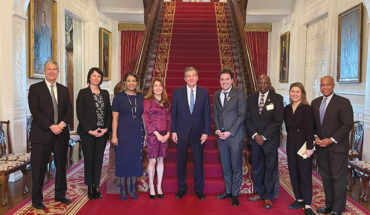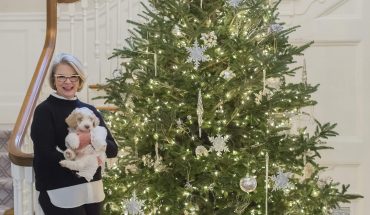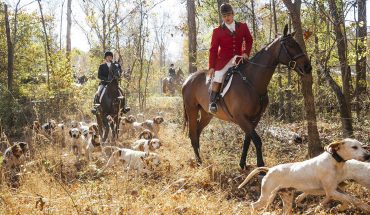
John Replogle, President and CEO of Seventh Generation and Raleigh-based Seventh Generation Ventures
by Alex Granados
photographs by Travis Long
In bustling downtown Raleigh, a different kind of business person is rising. He or she is an entrepreneur, and while profit is his or her driving force, social good is too. These folks combine business acumen with the kind of idealism most commonly found on college campuses to form what are known as benefit corporations, or “B Corps.” Simply put, they are companies as interested in doing good as they are in making money.
And the Triangle – Raleigh in particular – has become an incubator for these kinds of enterprises. Of 1,165 certified B Corps in 37 countries, 14 are in the Triangle, and eight are in based in Raleigh. They range from the marketing firm Springleaf Strategies to Feelgoodz footwear, and they’re in good company. Fellow B Corps with national brands that you’ve likely heard of include Patagonia, Ben & Jerry’s, and Method Products.
These B Corps do more than sound good. They’re held to account by a nonprofit governing body to ensure they meet benchmarks for sustainability, social good, accountability, and transparency. They race to a so-called triple bottom line, gauging success on social, environmental, and financial fronts. Not every socially responsible company is a B Corp., but the model has set a standard that similar ventures follow.
“B Corp. is to business what Fair Trade certification is to coffee, or USDA Organic certification is to milk,” says the Community of Certified B Corporations.
The Hub
Raleigh’s John Replogle, 48, CEO of Vermont-based B Corp. Seventh Generation, says Raleigh and the Triangle are ripe for the emergence of B Corps. “We’ve got amazing talent, we’ve got incredible universities that are doing really cutting-edge research…we’ve got partnerships like American Underground and HQ that allow those entrepreneurs to convene, and increasingly we’re finding more and more access to capital.” Replogle’s Vermont company makes environmentally-safe household products. Its Seventh Generation Ventures, owner of the Bobble, a popular filtered water bottle, is housed downtown at HQ Raleigh. It’s also working with a triple-bottom-line gameplan.
HQ – which is in the process of becoming a certified B Corp. – is the center around which many of the area’s socially responsible ventures spin. It’s an entrepreneurial hub where start-ups can rent cheap space and access meeting rooms, coffee, free beer, and a community of people who can help them grow their business.
You don’t have to be a social entrepreneur to join, but HQ’s founders say they created the space around values like “empower others,” “think big” and “leave the world better than you found it.”
“We set out to curate a community very much with these values in mind,” says Christopher Gergen, 44, one of HQ’s founders, and the CEO of Forward Impact, a company that helps budding entrepreneurs get their socially-responsible projects off the ground. “We’ve been extremely happy with how this is unfolding.”
HQ evolved out of the first Innovate Raleigh Summit, a gathering that explored the state of innovation in the city in 2012. Gergen got together afterward with Brooks Bell, founder of a Raleigh-based online optimization firm. The two started talking about an experimental community space for entrepreneurs, and out of that, HQ was born. It started on Hillsborough Street with founders Gergen and Bell, as well as Bell’s husband Jesse Lipson, founder of ShareFile (now vice president and general mangaer of the Documents Cloud for Citrix, which bought his company), and Jason Widen, COO of Forward Impact. HQ moved to its current space on Harrington Drive in March 2014 because it needed more space.
Today, HQ has 96 companies working in its 15,000 square feet. Headbands of Hope is one of them. It was created by Jessica Ekstrom with the mission of providing fashionable headbands for girls who have lost their hair as a result of chemotherapy.
She discovered that for these girls, wigs were embarrassing. They needed something better.
“They didn’t really want to hide what they were going through, but just wanted something to feel feminine again,” she says.
She operates on a model first popularized by the shoe company Toms, so for every headband purchased, another is donated. Since the company launched in 2012, it has donated more than 30,000 headbands.
For Gergen, HQ is about companies like this one.
“The story of HQ is really told through the stories in the community,” he says. “We take great pride in terms of the kind of impact that our community is making.”
The benefit of beans
Larry’s Beans coffee is well known to any java-loving Triangle resident. The local company’s beans and brew fuel coffee shops, bakeries and kiosks across the area. But while people drink the coffee because they like it, they might not know about the company’s dedication to the social good.
It began in the early ’90s. Larry Larson, now 47, was working at a coffee shop and studying for an economics degree at N.C. State. He began to sneak into the shop at night to brew his own beans, and quickly realized he enjoyed doing that more than he did studying economics.
His original idea didn’t necessarily involve social good, but Nathan McGhee, 43, the employee in charge of sustainability at the company – which has been a registered B Corp. since 2011 – says such ideas were already part of the DNA.
Today Larson says he wants his company to be an example for other businesses to follow.
“Businesses tend to be disconnected from the impact their choices have on people and the planet,” he says. “I want to show that a business can make decisions that produce positive impact while being profitable.”
McGhee, also known as the musician Bullfrog-Willard McGhee, says Larson is a businessman at heart, and his interest in sustainability is more about making sure Larry’s Beans is around for a long time.
“For Larry, sustainability is common sense. I don’t think there is a lot of touchy-feely hippy stuff there,” he says.
Of course, Larry’s Beans’ mission is making coffee, and McGhee said they ship many tons of it each month. But when you go out to the facility on Gavin Street near downtown Raleigh, it’s clear how much time and attention the company spends on sustainability.
The company’s warehouse buildings are lit almost entirely with huge skylights. While there are lightbulbs on the ceiling, they’re often dark. Huge cisterns sit outside, connected to pipes running from the ceilings. These provide the water used for the bulk of operations at the company (not to brew the coffee). The water is also piped up to solar arrays on the roof where it is heated, and then brought down to the floor in the main office to provide ambient heat.
Compost bins litter the property, including one that contains 40,000 worms that are available to anyone who wants some. Garden plots border the front end of the property, and inside one of the warehouse buildings, staircases are made out of reclaimed wood.
And of course, the company recycles. In fact, with three buildings and 16 employees, they only create two cans of real garbage a week.
As for the coffee itself, it’s bought from fair-trade farm co-ops in countries like Guatemala, Peru, Ethiopia, Honduras, Mexico, and Sumatra. Fair trade ensures farmers get a fair price for their coffee, something that’s important in countries where farmers are often exploited and forced to sell their beans at cheap prices to satisfy market demands.
Ad man
David Baldwin, 52, had one of the best ideas of his life at the worst possible time. A veteran of McKinney advertising firm in Durham, Baldwin decided he wanted to go his own way, but he wanted to do it a little differently.
“I was very naive about it,” he says. “What I thought I could do was, well, I thought I could build a company on values instead of a business plan.”
That great idea launched as Baldwin& in January 2009, right after the stock market crash that set the country into economic turmoil.
The company he envisioned would be an advertising firm, kind of like McKinney, but values would separate it from the competition.
“We want to do great work, we want to enjoy doing it, we want to have a great life, we want to run a good business,” he says, in that order.
Baldwin started the company with three other people, Bob Ranew, 53, Erin Bredemann, 41, and Jerry Bodrie, 47. One of their goals was to support companies they could believe in, companies like Durham’s Burt’s Bees (which was run at the time by Seventh Generation’s John Replogle).
“They’re talking about sustainability, they’re talking about packaging. They’re talking about how things affect your health and your skin,” Baldwin says. “I love that they’re not just having profitability conversations.”
These B Corp. types aren’t Baldwin&’s only clients, but they’re the bulk of them. Baldwin& itself has been a registered B Corp. since 2012.
“It’s why we’ve gone after the kinds of clients we’ve gone after,” Baldwin says, like LED light bulb maker Cree. “And we say ‘no’ to things all the time that we don’t think is the right opportunity for us and isn’t good for the world…We have to believe in what they’re up to, or we have to be very passionate about what they’re doing.”
The company’s dedication to the social good extends beyond working with the best of B Corps and extends to the way it treats its employees.
“We don’t watch the clock at all,” he says. “It’s all about accountability and delivery. If you’re someone who delivers your work on time, you can do whatever you want.”
That attitude is evident when you walk into the company’s office on West Davie Street. You may be greeted by a dog – one of the employees’ pets – and if you’re thirsty, Durham-based Ponysaurus beer is on tap. But don’t be deceived. The company’s 32 employees work hard enough to bring in about $4.5 million in annual revenue from clients all over; Baldwin describes his company as a national firm that happens to be located in Raleigh.
Green food
Green Planet Catering is based on a simple idea: catering with environmental sustainability in mind.
It was created by Daniel Whittaker, 35, and two of his friends, and launched out of the Tir Na Nog Irish pub kitchen almost eight years ago. At the time, Whittaker and his friends were all veterans of the Raleigh food scene and wanted to start something of their own. They were interested in organic food and started buying locally, mostly to offset costs. Quickly, they recognized that words like “organic” can sound expensive and frighten clients off. So they purposely avoided the term. Sustainability, they decided, is what would separate them from their competitors.
When they started, sustainable food wasn’t as hot a topic as it is now. But that began to change.
“As we kind of got older and older and more product became available… we just started purchasing more from individual farmers, and more from vendors who had grouped together farms so they could sell for them,” he said.
About 40 percent of what the company purchases comes from local farms. That includes pork, vegetable and grain-based items. The company buys a lot of its meat from surrounding states like Georgia and Pennsylvania, because it’s difficult to get meat locally if you don’t want to buy an entire cow.
In addition, Green Planet Catering – which used to be a registered B Corp. and says it still runs according to B Corp. principals – also operates its own farm in partnership with N.C. State, where employees grow things like cucumbers, beets and tomatoes. The company gets about 10 percent of its ingredients there.
Furthering the green mission, the company composts leftover food from any event, and uses biodegradable materials like cups, forks and knives made of corn starch.
Many of its clients, including companies like Belk and universities like Duke, UNC-Chapel Hill and N.C. State, say they value Green Planet’s eco-friendly commitment.
Green Planet Catering isn’t purist; if a company wants a less-green event, Whittaker will accommodate, but he says his employees do their best to steer the client in a different direction. Often, he says what he finds is that clients are attracted to his company not because of the sustainability aspect of the business, but just because the food tastes better.
“What’s really starting to happen is they get the food quality aspect of it,” he said. “They say ‘Your food tastes better. Why?’ And we say because it just came out of the ground. Or it’s only four days old instead of 14 days old.”
For more on B Corps in Raleigh, the Triangle, and around the world, go to bcorporation. net.
Triangle B Corps
AVANT Group LLC
Baldwin&
Bull City Burger and Brewery
Caliber Technologies
Dimensions in Occupational Health and Safety
Feelgoodz LLC
JustNeem LLC
Larry’s Beans
Morning Indigo
Rain Water Solutions, Inc
Riley Life Logistics
SJF Ventures
Solidarity Capital Group
Southern Energy Management
Springleaf Strategies
Spotlight Solar, LLC
The Change Creation, Inc.
The Redwoods Group
VIF International Education
WasteZero, Inc.







